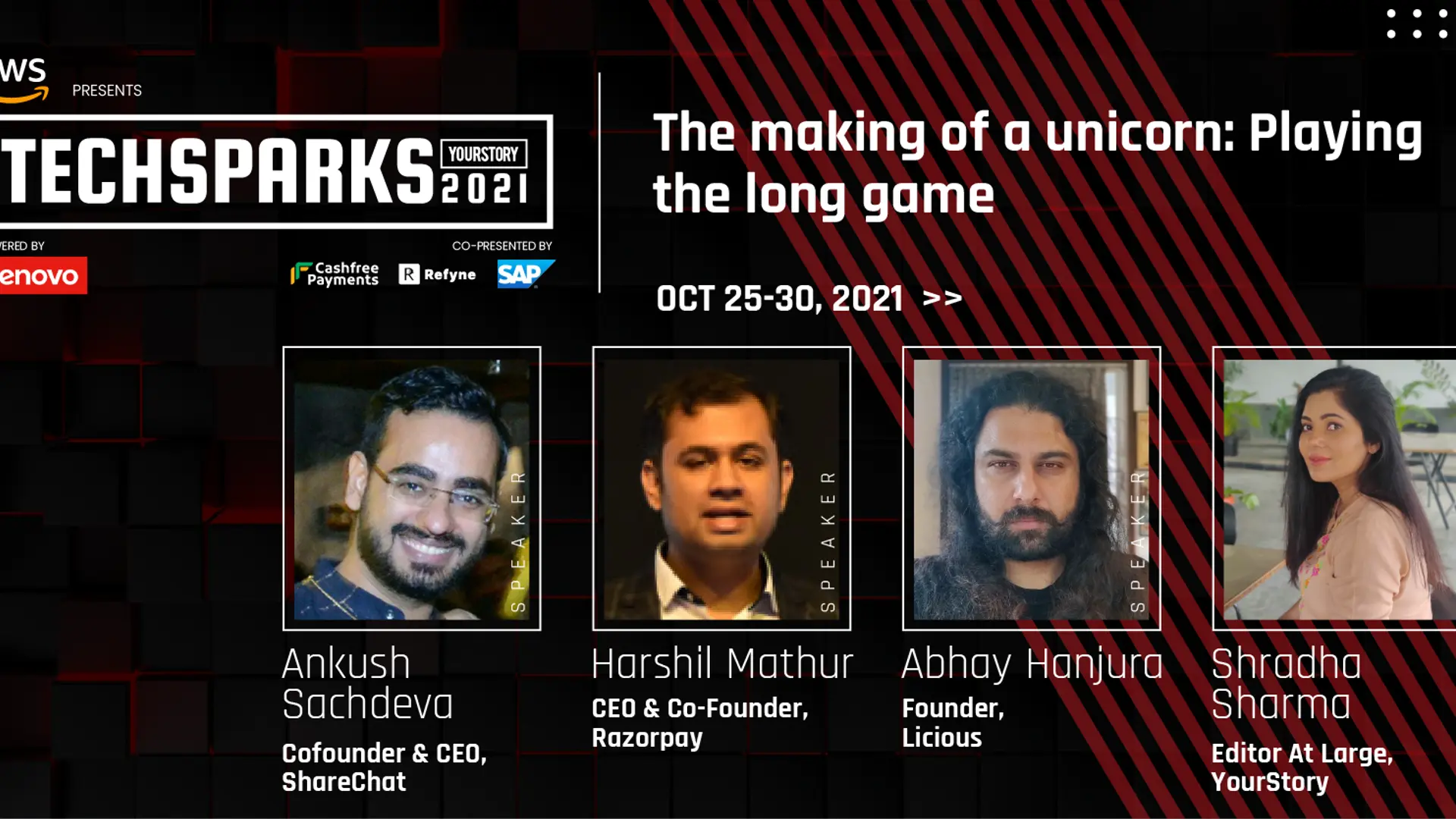How unicorns look at brand building
In a virtual panel discussion at the Grand Finale of TechSparks 2021, founders and CEOs of - Razorpay, Harshil Mathur; ShareChat, Ankush Sachdeva; and Licious, Abhay Hanjura spoke about brand evolving and building larger brands.
Traditionally, most startup founders begin with an aim to solve a problem and think from a product-first perspective. But as they grow they need to look closely at the brand and evolving the organisation.
At the Grand Finale of the 12th edition of TechSparks, India's most influential startup-tech conference hosted by YourStory, in a virtual roundtable, Harshil Mathur, Co-founder and CEO, , Ankush Sachdeva, Co-founder and CEO, , and Abhay Hanjura, spoke to Shradha Sharma, Founder and CEO of YourStory about nuances of brand building from unicorns' perspective.
A living organism
Accoridng to Abhay Hanjura of , brand isn’t inanimate. It is a living being, and you need to embrace that.
“For example, Vivek and I look at Licious like a six year old in the context of what it can do. After a certain point, an entrepreneur can only be the guardian and guard rail of context," Abhay said. "In the early days, you have to live the brand. When it comes to scale what becomes extremely important is creating ownership of the brand,” he added.
Abhay alluded to figuring out, as an organisation, what your northstar is? That answer has to be clear. In Abhay's view, if you don’t put a price to your wicket nobody else will.
There needs to be a sense of pride and collective belief that what you are building is special needs to be there, said Abhay.
Abhay (and his co-founder Vivek) We realised after sometime it will be hard to keep explaining to people what the brand Licious is. So I have written a 70 page book from day one of Licious to today, every single year, how the brand evolved, how we take short term decisions, how did those affect the brand, what did the consumer say… We give the people the book when they join,” added Abhay.
He said it is the pride of association with the brand that ensures consistency between external and internal brands. You cannot be one thing outside, and internal something else. You need to live it through a set of values everyday, and your rituals will guide you. Walking the talk is important.
“It is tough to decide to dump three tonnes of produce because you suspect there could be a quality issue. Saying No to crores of revenue but it defines the character of the business. It is what you do when nobody sees you,” said Abhay.
All three things of parental responsibility, objectivity, and childlike curiosity have to exist harmoniously. This also makes hiring harder, you say no to many people, taking decisions become harder. It is a harder process building a brand, if you don’t stand for anything, you will fall for everything.
But you have to embrace it.
Concentrated effort
Harshil added many people say B2B does not have brands, because it is hard to create a persona.
“This means for us a brand has to be an even more concerted effort because by default we become one of the five service providers, and then you go and pitch to a customer and the customer is like you also give us a quote. Now people are like okay we want to work with you because we have seen you in many places, heard good things about you and that takes effort,” said Harshil.
It starts internally, and then only it oozes externally. It happens in your conversations and discussions and people say everyone at Razorpay speaks a different language.
“In our case the people on the ground also need to be well-taken. And we have to spend a lot of time training and what the brand stands for and what we will talk about and what not. The brand is decided by the founders and what they believe in. Consultants just help in drilling it down. It is a living and breathing organism,” said Harshil.
Brand is a projection of what you stand for
It is the projection of what you stand for and you need to believe in that truly.
“When we started out it was uncool for us to build a Bharat non-english network, but we were unapologetically Bharat brand and we believed in it and we kept projecting that. We gave the consumers the view that they are on a platform to be proud of. There has to be a pride associated,” said Ankush.
It is about the people who put in investment like creators need to invest their time and creativity into the platform.
“You need to be clear what you stand for. You need to live and breathe it." said Ankush.
"We look at every decision like that, how will that product or algorithm decision impact our smaller creators. We are here for the common person to become big. It has to marry internal thought process and external projection,” he added.
What next?
Licious' Abhay told that, going forward, they will be seen doing the same things with the same repetitive boredom.
"That is the hardest bit - doing the same thing over and over again and not getting distracted by the money in the bank," said Abhay. Sometimes ‘Kuch Naya' is not necessary, sometimes doing the same-old-thing can make you perfect, and sharpen the job to the point of being boring. "Laser sharp focus on the hard problem is very important," he added.
Harshil said that Razorpay's goal is to build a financial ecosystem for businesses. "If there is someone who starts something, how can I make their financial journey simpler when they sign up on Razorpay," said Harshil. "We want to take care of everything to do with money while they focus on building their business."
In the next three to four years, a small business should just startup and sign up on Razorpay, and focus on growing the business." Harshil added.
ShareChat's Ankush opined that, as a business, you need to ask the question what things will not change, what is the core that customers will want.
"And for us that is when they tap on a or icon they always want the most relevant content, they will never come back and say don't give me relevant information today," said Ankush.
Getting better at the content relevance is the critical part. This requires a strong AI team and we decided to go global - and we will continue to do and build that.
Apart from that, Ankush shared that the social networking app is keen to focus on a few interesting things and one of them being enabling creators to build livelihood on the platform.
We keep hearing stories of creators spending hours creating content, and it should be a full time job for them. We are war footing towards virtual commerce, brand integrations, creators, and we want $100 million to go into the pockets of our creators annually.
Edited by Rajiv Bhuva




